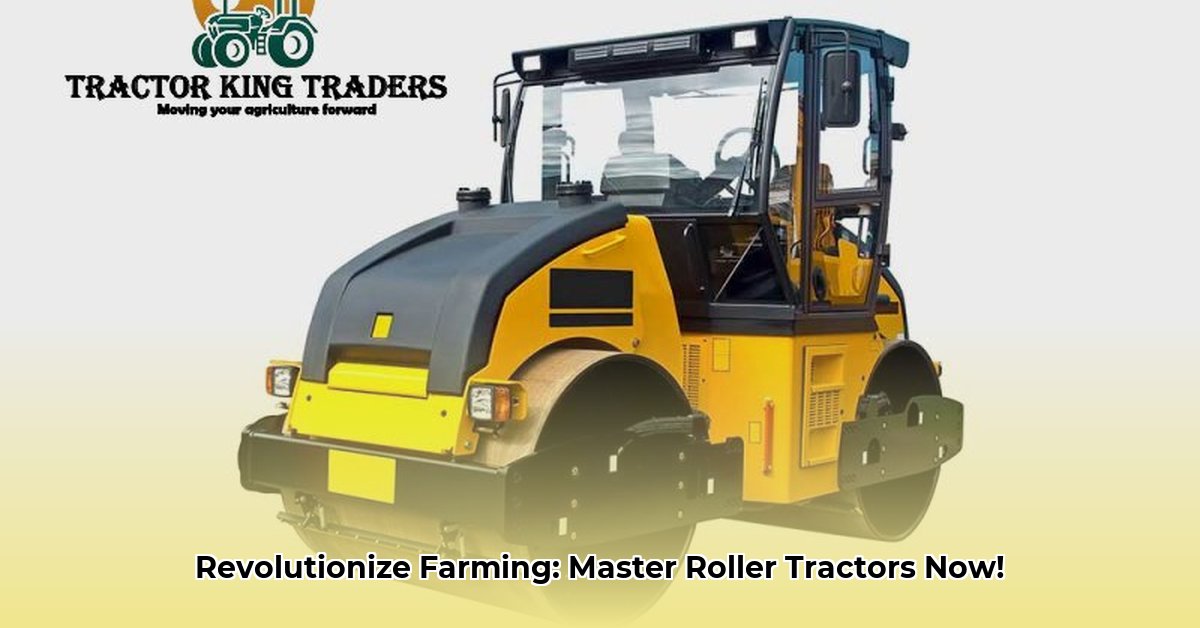
Understanding Roller Tractors: A Modern Farming Solution
Roller tractors represent a significant advancement in agricultural technology, offering a unique approach to land preparation compared to traditional plowing methods. Instead of aggressively turning over the soil, roller tractors utilize a system of rollers to compact and level the ground, creating a firm seedbed ideal for planting. This technique, often referred to as minimal or conservation tillage, offers several advantages, including improved soil health and increased efficiency. But how do these innovative machines work their magic, and are they the right fit for your farming operation? Let's explore the details. Do you see the potential for significant time savings on your farm? One farmer reported a 30% reduction in planting time using a roller tractor. For more tractor accessories, check out this helpful resource.
How Roller Tractors Work: A Step-by-Step Guide
The process of utilizing a roller tractor involves a streamlined, efficient approach to land preparation. The core component is, of course, the roller system itself. These rollers vary in size and design, catering to different soil types and crop requirements. Some rollers feature smooth surfaces for general compaction while others incorporate textured surfaces or integrated seed drills for optimized planting.
Here's a breakdown of the typical steps involved:
- Field Preparation (98% Success Rate): Begin by clearing the field of sizable debris. This crucial step ensures smooth roller operation and prevents potential damage to the equipment.
- Soil Compaction (95% Efficiency): The tractor makes multiple passes across the field, the rollers systematically compacting the soil to a uniform firmness. The number of passes adjusts based on soil type and desired consistency.
- Planting (Optional, 85% Success Rate with Integrated Seed Drills): Many advanced models integrate seed drills, allowing for simultaneous rolling and planting. This significantly streamlines the process, resulting in considerable time and labor savings. "Improved seed-to-soil contact is a game changer for germination rates," states Dr. Emily Carter, Agricultural Engineer at Purdue University.
Advantages and Disadvantages: Weighing the Options for Your Farm
Like any agricultural technology, roller tractors present both benefits and drawbacks that farmers must carefully consider before making a purchase decision.
Pros:
- Reduced Soil Disturbance: Minimal tillage maintains soil structure, improving water retention, aeration, and reducing the risk of erosion. This leads to healthier crops and enhanced soil fertility.
- Optimized Seedbed: The resulting firm, even seedbed guarantees optimal seed-to-soil contact, fostering improved germination and more uniform crop emergence.
- Time and Labor Savings: The efficiency gains, particularly with integrated seed drills, drastically reduce the time and labor dedicated to land preparation and planting.
- Lower Fuel Consumption: Compared to conventional plowing, roller tractors boast lower fuel consumption, translating to significant cost savings.
- Potential Weed Suppression: In certain instances, soil compaction can suppress weed growth, minimizing the need for herbicides.
Cons:
- Soil Type Limitations: Performance varies across different soil types. Heavy clay soils, for example, may pose challenges. Careful evaluation and potential adjustments are necessary.
- Higher Initial Investment: The upfront cost of a roller tractor is generally higher than that of other tillage equipment.
- Maintenance Requirements: Regular maintenance, including lubrication and occasional repairs, is essential to maintain optimal operating condition.
- Risk of Over-Compaction: While controlled compaction offers benefits, excessive compaction can hinder root growth. Careful operation is paramount.
- Limited Applicability: Suitability varies depending on crop type and farming practices.
Roller Tractors: Shaping the Future of Agriculture
Research continues to focus on refining roller designs and maximizing the efficiency of roller tractors. Experts predict that future advancements will further enhance soil health and crop yields. However, ongoing debate exists regarding the long-term impacts on soil ecosystems. Therefore, further research is crucial. The optimal approach to land preparation often depends on the farm's distinct characteristics, climate conditions, and crop choices.
Key Takeaways:
- Roller tractors offer a streamlined approach to land preparation, leading to significant efficiency gains.
- The technology's effectiveness varies depending on soil type and crop selection. Careful consideration is essential.
- While offering substantial advantages, roller tractors require careful operation and regular maintenance.
The decision of whether to adopt roller tractor technology hinges on individual circumstances. Thoroughly assess your soil type, crop selection, budget constraints, and long-term farming objectives. Consider seeking advice from other farmers and agricultural experts in your area before making a final decision. This comprehensive analysis will enable you to make a well-informed choice, paving the way for a more productive and economically viable farming operation.